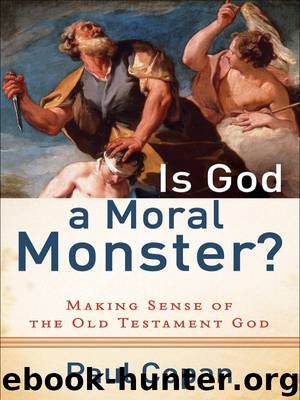Is God a Moral Monster? by Paul Copan

Author:Paul Copan
Language: eng
Format: epub
Tags: ebook, book
Publisher: Baker Publishing Group
Published: 2010-11-24T16:00:00+00:00
Leaving Wife and Children Behind (Exod. 21:2–6)
If you buy a Hebrew servant, he is to serve you for six years, but in the seventh year he will go out free without paying anything. If he came in by himself he will go out by himself; if he had a wife when he came in, then his wife will go out with him. If his master gave him a wife, and she bore sons or daughters, the wife and the children will belong to her master, and he will go out by himself. But if the servant should declare, “I love my master, my wife, and my children; I will not go out free,” then his master must bring him to the judges, and he will bring him to the door or the doorposts, and his master will pierce his ear with an awl, and he shall serve him forever. (Exod. 21:2–6 NET)
Nuzi was located near Kirkuk, Iraq, close to the Tigris River.6 Thousands of tablets—the Akkadian Nuzi texts—from the second millennium BC were found there. They mention legislation similar to this: if a slave entered a master’s home single, he left single. If he entered with a spouse, then he left on his marry way! Now, if a wife had been given to him by his master, then she (and any children from this union) belonged to the master.
According to this Exodus passage, if a man was given a wife by his master/ employer and they had children, then he had a choice: he could either leave by himself when the seventh year of debt release came, or he could continue as a permanent servant to be with his wife and children. It’s a less-than-ideal setting to be sure, but let’s probe the text more deeply.
At first glance, this text seems to treat females (and children) unfairly. The (apparently) favored male can come into a service arrangement and then go out of it. Yet the wife he married while serving his employer and any children who came while he served were (so it seems) “stuck” in the master’s home and couldn’t leave. That’s not only male favoring; it strikes us as criminal! Wasn’t this an earlier version of slave families during the antebellum South (like Frederick Douglass’s) who were broken up and scattered by insensitive slaveowners?
Our first point in response is this: we’re not told specifically that this scenario could also apply to a woman, but we have good reason to think this situation wasn’t gender specific. (We’ll see shortly that Deuteronomy 15 makes explicit that this scenario applied to a woman as well.) This is another example of case law: “if such and such a scenario arises, then this is how to proceed.” Case law typically wasn’t gender specific. Furthermore, Israelite judges were quite capable of applying the law to male and female alike. An impoverished woman, who wasn’t given by her father as a prospective wife to a (widowed or divorced) man or his son (Exod. 21:7–11), could perform standard household tasks.
Download
This site does not store any files on its server. We only index and link to content provided by other sites. Please contact the content providers to delete copyright contents if any and email us, we'll remove relevant links or contents immediately.
The Secret Power of Speaking God's Word by Joyce Meyer(3165)
Signature in the Cell: DNA and the Evidence for Intelligent Design by Stephen C. Meyer(3123)
Real Sex by Lauren F. Winner(3006)
The Holy Spirit by Billy Graham(2941)
The Gnostic Gospels by Pagels Elaine(2521)
Jesus by Paul Johnson(2351)
Devil, The by Almond Philip C(2324)
23:27 by H. L. Roberts(2245)
The Nativity by Geza Vermes(2226)
Chosen by God by R. C. Sproul(2159)
All Things New by John Eldredge(2156)
Angels of God: The Bible, the Church and the Heavenly Hosts by Mike Aquilina(1952)
The Return of the Gods by Erich von Daniken(1927)
Angels by Billy Graham(1920)
Knowing God by J.I. Packer(1850)
Jesus of Nazareth by Joseph Ratzinger(1802)
The Gnostic Gospel of St. Thomas by Tau Malachi(1781)
Evidence of the Afterlife by Jeffrey Long(1776)
How To Be Born Again by Billy Graham(1775)
